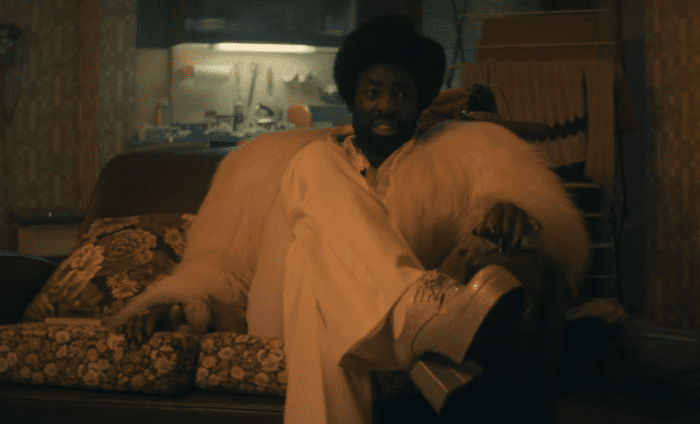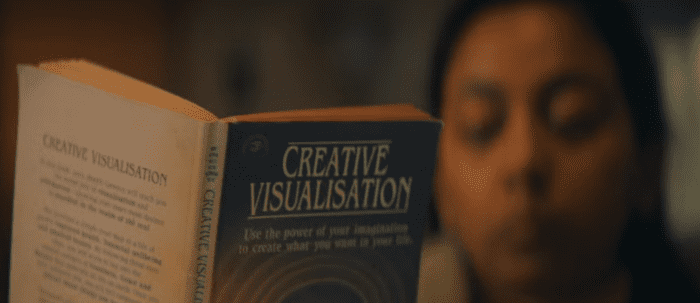The following recap and review contains spoilers for Black Mirror, “Demon 79” (written by Charlie Brooker & Bisha Ali and directed by Toby Haynes)
If you’ve been living in the Black Mirror universe for the last 12 years, you begin to see the interconnectedness and woven tapestry of the world that Black Mirror has built. Stories build on themselves over the seasons and we are treated to Easter Eggs galore as callbacks to previous episodes. But never have we seen anything like “Demon 79,” the fifth and final episode of the just-released Season 6.
Billed as a Red Mirror movie, “Demon 79” conjures up memories of classic 1970s horror films like Carrie, Sisters, and The Exorcist; a time when the supernatural, the mysterious, and the unexplainable ruled the genre before Leatherface and Michael Myers entered the picture. What exactly does it mean for the movie to be labeled with “Red Mirror?” My best guess is that this innovative approach to a Black Mirror episode is meant to be more of a movie that has been created inside the greater Black Mirror world. Red Mirror seems to be the Blumhouse to Streamberry’s Netflix (if you’ve seen the “Joan is Awful” episode).
The episode centers around modest shoe saleswoman Nida (played by Anjana Vasan), an Anglo-Indian immigrant living in the small town of fictional Tipley, England. Set in 1979 during an unsettling time in Great Britain’s history and politics, the town of Tipley, and the entire country, are dealing with critical issues of immigration, labor movements, job loss, and parliamentary elections. It’s with this backdrop that the episode asks its most fundamental question: Which demon is worse to unleash on the world? The one we know lives within us or the one that lives inside others?
Nida is incessantly harassed at work (her co-worker rats her out because she doesn’t like the smell of the Indian food Nida brings for lunch), her front door to her flat is vandalized, and she is generally ostracized from a largely white British community. We learn that her mother recently passed away, which has forced Nida deeper into isolation and loneliness, and she has begun having violent visions of things she would do to others—like co-worker Vicky—who mistreat her and mistreat others.

Banished to the department store basement to eat her lunch, Nida discovers several items that seemingly belonged to Geoffrey Possett, the founder of the department store. There are newspaper clippings of three mysterious deaths and an article about a British May Day that was a “grand success.” She also nicks her finger when she discovers a small talisman, and her blood on it activates a rookie demon by the name of Gaap (played by Paapa Essiedu) who visits her that evening.
Gaap, who decides to dress like the lead singer from Boney M. to make Nida more comfortable, explains the rules of engagement now that Nida has “anointed” the talisman with her blood. Gaap will be her guide through three murders she must commit in the next three days, lest she unleash an apocalypse of biblical proportions on the entire world. The fate of everyone on the planet, Gaap assures her, rests on the mission of her killing three people before May Day comes in just three short days.
Gaap, who has a sharp wit and is even more sharply dressed, is meant to distract us and pull us out of what should be a scary moment for Nida. A demon arriving and declaring you must commit murder would be a harrowing situation, but Gaap seems to believe his first job is putting Nida (and, in turn, us) at ease with what’s about to happen.

(I also can’t help but point out that Gaap the demon and corporate GAAP—Generally Accepted Accounting Principles—both serve a very specific and important function. They both are arbiters of rules that one must follow to meet certain goals and benchmarks. They are the guidebook by which decisions are made. When Nida wants to know why she can’t kill people who committed murders of their own, Gaap assures her “as far as my boss is concerned, they are playing for the home team.”)
It’s at this point that any viewer of this episode must stop and consider, “Is all of this real or is it in Nida’s head?” Did she authentically activate a demon who demands a blood sacrifice or is Nida going the same route as Bill Hader’s Barry, and looking for some way (any way!) to justify putting her violent thoughts into action? Does the talisman give her cover to exact some revenge for all of the tormenting and harassment she experiences?
Before Gaap shows up, we see Nida reading Create Visualisation: Use the Power of Your Imagination to Create What You Want for Your Life. Is that foreshadowing or just a MacGuffin meant to throw us off the scent?

Gaap is able to help Nida see what her potential victims have done or what they will do in their lives. Sort of like a spoonful of sugar to help the murder medicine go down smoother. She first reluctantly clobbers a pedophile who is abusing his eight-year-old daughter. After getting a bitter taste of the first murder, the second and third go down a little easier. Nida kills Keith Holligan (played creepily by Nicolas Burns), who strangled his wife at some point in the past, but was released and not sent to prison for some reason. Keith’s brother stumbles home during the act so Nida has to take care of him as well.
But those pesky demon bosses and their stringent accounting principles won’t give Nida credit for Keith. He killed someone so his death doesn’t count. Just as Nida is about to make Sophie’s Choice of Vicki or her equally bigoted boss Mr. Duncan, a local conservative party candidate comes into the shoe store. Michael Smart (played by David Shields) is a right-wing smooth operator who despises the Labour Party and secretly likes to admit that he favors strict non-immigration policies just like the white-supremacist group National Front.
Nida asks Gaap to see Smart’s future and is shocked to discover that if Smart were to be elected, his future would be to lead Britain down a fascist, anti-immigrant path that resembles much of what our country and other countries have witnessed far too often in the past six years. We also see in these visions glimpses of war, ruin, and even the robotic dogs in the episode “Metalhead,” which serves as a connection to the greater Black Mirror universe.

Nida chases him down, but the police catch her just before she is able to murder Smart. With that option now off the table, our future, it would seem, is set. If Gaap is real, and he is right, the world will destroy itself in a blaze of fire at the end of the third day. If he is wrong, the world Nida knows is doomed anyway once Michael Smart begins his rise to power. His policies and rhetoric bring war, hatred, and destruction to their entire country.
Under the backdrop of a real election that had massive implications for the future of Great Britain, “Demon 79” attempts to understand if anything we do actually matters. Can we change our own self-destruction with some disruption and by pushing certain people off their course? Or are we doomed to face it no matter what? Perhaps the best answer for all of us is in the offer Nida accepts at the end. Gaap offers to take her with him to “eternal oblivion” as the world around them crumbles and explodes. She gladly accepts, knowing that in a world where the only options are oblivion or death, it’s an easy choice.

